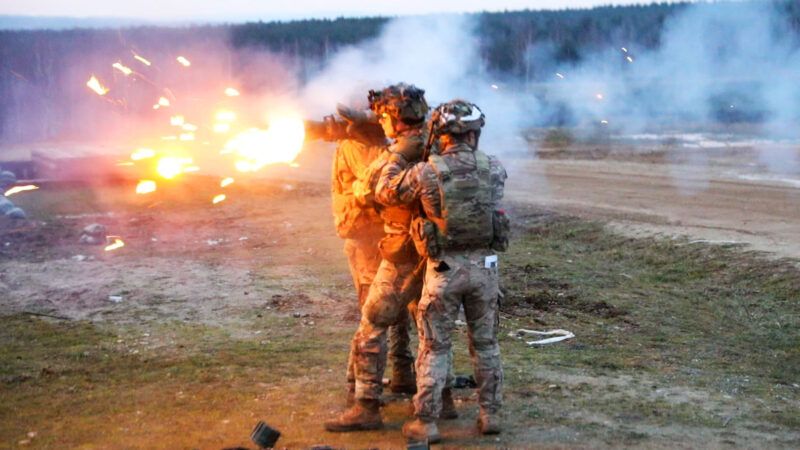America's Loose Ends in the Middle East
They say the U.S. is pivoting to other conflicts, but the Pentagon hasn't exactly left the Middle East and North Africa behind.

The notion that America is pivoting to great power conflict—global rivalry with another major (and likely nuclear) power in economic, diplomatic, and maybe even military venues to dominate the international order—has become a bipartisan truism. President Joe Biden's National Security Strategy followed former President Donald Trump's fixation on China in naming "Out-Competing China and Constraining Russia" as the first of Washington's global priorities. The strategy relegated terrorism to a lesser subsection, and indeed 2022 is the first year in two decades without an active U.S. combat mission in Afghanistan, Iraq, or both. After months dominated by the war in Ukraine and worries over Taiwan, it feels like the pivot is complete.
Yet that tidy narrative of America turning to a new chapter isn't exactly true. Yes, the big wars in Afghanistan and Iraq are over, at least for the foreseeable future. And yes, we have in important ways left the post-9/11 era behind.
But the United States has certainly not departed from the greater Middle East, and it would be a mistake to let this new focus on great power rivalries exacerbate public neglect of our lingering military interventions and long-term deployments in the region. Too often ignored even at their peak, these projects still deserve our scrutiny.
Take, for example, this week's letter to the Pentagon from Sen. Elizabeth Warren (D–Mass.) and Rep. Sara Jacobs (D–Calif.), which makes a case that the Department of Defense (DOD) is undercounting U.S.-caused civilian casualties in the Middle East and failing to make condolence payments even for the civilian deaths it does acknowledge.
The most recent Pentagon report on civilian casualties from U.S. military operations "did not admit to any civilian deaths in Syria," the lawmakers write, "despite credible civilian casualty monitors documenting at least 15 civilian deaths and 17 civilian injuries in Syria in 2021." For a single U.S. strike in Syria in 2019, they add, the Pentagon recognized just four civilian deaths. But New York Times reporting turned up evidence that this number was much too low, and the legislators note that local accounts put the death toll far higher: "at least 160 civilian deaths, including up to 45 children."
Likewise, Warren and Jacobs say, the report "revealed that DoD made only one total ex gratia payment in 2021, despite an annual $3 million authorization from Congress for ex gratia payments and despite the large number of cases [of civilian casualties] that DoD has confirmed as credible." The Pentagon operates on an arbitrarily short timeline of 90 days to make these condolence payments, the lawmakers charge. Our government also makes it needlessly difficult for families of victims to make claims, they say, even failing to translate the Defense Department's civilian casualty reporting website into relevant local languages.
This is all very distant from us, and at this point it's perhaps "only" a few dozen or hundred civilian deaths left unrecognized and unrecompensed each year. But it is surely not distant to the families whose children are accidentally blown up by American bombs, then never even acknowledged by our officials.
And the Warren-Jacobs letter is just one of a steady trickle of stories of ongoing U.S. military action in the Middle East and North Africa which we should not let pass unnoticed.
Last week, the Biden administration squelched Sen. Bernie Sanders' (I–Vt.) plan to introduce a war powers resolution which would have ended at least some U.S. military support for the Saudi-led coalition intervention in Yemen's civil war. The coalition has been credibly accused of war crimes, and Yemen is subject to severe humanitarian crises of violence, hunger, infectious (and preventable) disease, and lack of access to clean water and basic health care—all of which have been exacerbated by a conflict protracted, in part, by U.S. involvement.
The week before that, U.S. special forces carried out an operation against the remnants of the Islamic State in Syria. U.S. drone strikes continue there and in Somalia too, though Congress never authorized military intervention in either country and has no apparent intent to name a timeline or conditions under which it might end.
And while our chaotic withdrawal from Afghanistan last year was completed, longstanding promises to give refuge to Afghan translators and others who supported U.S. forces there remain only partially fulfilled. Meanwhile, the end of combat operations in Iraq was not a comparably clean break: About 2,500 U.S. troops are still doing advise-and-assist work with the Iraqi government. They'll be there indefinitely, outgoing Central Command Chief Marine Gen. Frank McKenzie indicated this past spring. So will the thousands of U.S. forces still stationed in Saudi Arabia, Jordan, Niger, and other nearby countries.
This is all very remote from, say, the surge of 2010, when around 100,000 U.S. soldiers were in Afghanistan—or, before that, the intense national debate over the invasion of Iraq in 2003. The last few years, and particularly 2022, do seem to mark a transition in our foreign affairs.
Yet it's an unfinished transition, and the United States' ongoing presence in the greater Middle East remains substantial enough that we'd be alarmed if any other country replicated it in a region similarly far from home and with an execution similarly lacking in public interest or legislative oversight. Perhaps, even while turning to newer dramas in Europe and Asia, we can summon some of that alarm about our own loose ends.


Show Comments (32)